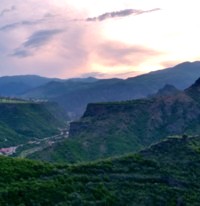The Countries of the Caucuses
As a result of its mineral wealth and strategic position, this is one of the most fought over regions on earth.
The Caucuses were first conquered and 'civilised' by Cyrus the Great of the First Persian Empire, around 500 BCE, and then briefly by the Greeks, under Alexander, followed by the Romans and Byzantines alternating with the Persians again.
With the rise of Islam after 632 CE the Arabs began their conquest of Persia and Egypt, reaching the Caucuses in the eighth century.
They were followed by the Mongols - Genghis Khan - in the 13th century.
The Khanates (kingdoms) Genghis Khan and his son established generally adopted the prevailing religion of the conquered lands. Several Khanates in this region fell to the growing Russian Empire (Christian).
In the late 14th century a new conqueror arrived, Timur (Tamerlane) 'The Sword of Islam' to overthrow both the ruling Urus Khan and his nephew Tokhtamysh and to defeat the Russians. Tamerlane also assisted in the defeat of the early (Islamic) Ottomans, briefly saving Constantinople for the (Christian) Byzantines.
But that reprieve was short lived. In 1453 after a long siege the Ottomans took the City, renaming it Istanbul, and went on to build their own great Ottoman Empire, which then lasted over four hundred years, until the end of the Great War (WW1 1914-18).
The modern borders in the area today were largely the outcome of the events surrounding the Great War and its aftermath. In particular the October (Bolshevik) Revolution in Russia in 1917 and the Treaty of Versailles (Treaty of Peace between the Allied and Associated Powers and Germany) at the war's end and the related Treaty of Sèvres (that initiated the partitioning of the Ottoman Empire and its dismemberment).
Yet the collapse of the Soviet Union in 1991 has wrought, perhaps, the most profound changes of all.
Bordered by Iran (Persia) and Turkey to the south and Russia to the north, present day Georgia and Armenia are located within wide mountain valleys of the south Caucasus, while modern Azerbaijan extends down from the mountains to the planes around the eastern Caspian. Georgia and Armenia are predominantly Christian while Azerbaijan is predominantly Muslim. Each have their own language and the Christian Churches also differ. Until 1991 the lingua franca (allowing them to communicate across communities) was Russian but the younger generation use English.
Over the peaks, on the northern slopes of the mountains, in Russia, despite being within a single Federation, things are little less disunited. There are seven semi-autonomous Caucasian Republics in Russia. From west to east these are the Republics of: Adygea; Karachay–Cherkessia; Kabardino-Balkaria; North Ossetia–Alania; Ingushetia; Chechnya*; and Dagestan.
Each has their own language, traditions and religious practices. The first three are Muslim by a small majority, the balance being non-believers; Christians; and some others. In contrast North Ossetia–Alania is predominantly Christian (various flavours) and Uatsdin (a neo-pagan religion of the Ossetian ethnic group) and only a small minority are Muslim. Non-believers, usually a big group in the former Soviets, are also relatively scarce. Ingushetia, adjoining, could scarcely be more different. The poorest and least developed region in the Northern Caucuses, the Ingush people are predominantly Sunni Muslim. They are ethnically and culturally similar, but separate from, the bordering Chechen people.
Like neighbouring Azerbaijan, the Russian Republic of Dagestan has access to oil and gas deposits under the Caspian. Economically more successful and more secular than its unruly neighbour, Chechnya, Dagestan responded to the Chechen 'troubles*' by hardening its borders against insurgents. Like Azerbaijan the majority of people are nominally Muslim yet, as in Azerbaijan, agriculture includes grape growing and wine making, in addition to traditional grazing and so on. As elsewhere in the Caucuses, countries and regions in the mountainous areas are rich in minerals and often have upland lakes and rivers providing hydroelectric power.
*Chechnya
Those of us who listen to the news have all heard of Chechnya. Today it's strategically important to Russia because of its oil fields. These were a target for Germany in two World Wars and have been disrupted by social unrest. Yet Chechnya has been a problem for Russia since Tsarist times, when Chechen Highlanders repelled Imperial forces. This initiated a series of 'ethnic cleansings' that dispersed Chechens across the world and hardened the resolve of separatists, who with the collapse of the Soviet Union, became a magnate for global power-politics.
The usual cold-war culprits facilitated the supply of modern weapons, ammunition and explosives to the revolutionaries to 'assist in their struggle' and in 1999 a full scale war began in Chechnya, spilling over into both Ingushetia and Dagestan, involving Sunni Muslim separatists and their foreign mujahedeen (those who engage in Jihad) and Arab supporters (read Saudi-Arabia again) that also carried the Chechen independence struggle to Moscow and other parts of Russia, via a series of well-planned terror attacks. These cost the lives of many hundreds of innocent people, including over 300 schoolchildren in a single attack, and the bringing down of a passenger aircraft. The terrorism seems to have been unsuccessful. In 2009 the Russian government announced that it had restored order and since that time the terrorism has indeed subsided.

